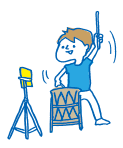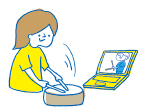Here are the answers to some popular questions about Kodo Taiko School, our new online taiko program.
We will update this page periodically. Feel free to contact us with any questions of your own.
Q1 Will the curriculum be different for each cohort?
A: The overall structure will be the same: each cohort will cover physical conditioning for taiko players, stage deportment, taiko fundamentals for fuse-uchi (upright taiko playing style), and practicing a Kodo Taiko School practice piece. However, we are constantly making new discoveries with each course, so we plan to continually hone and improve our courses based on our learnings from previous cohorts.
Q2 What level of skill is required to take this course?
Is the course content aimed at advanced taiko players?
A: The course was created to suit people who have been playing taiko for one year or more and who have experience playing in front of an audience.
At Kodo Taiko School, we want to share knowledge and skills that will help taiko players with some experience already to discover even more about this captivating instrument and art form.
Each class is small so we can tailor our instruction to each individual.

Q3 With foreseeable travel restrictions due to COVID-19, is there an alternative option for people who cannot go to Sado Island for the Taiko Camp at the end of the course?
A:We plan to hold a Taiko Camp once a year. If you take a Kodo Taiko School course and you cannot attend the next camp after your course, you are welcome to participate in another Taiko Camp at a later date.
Note: The Taiko Camp is optional and is not included in the course fee.
Q4 Are we able to record the lessons? Or will we have access to recordings of the lessons?
A: Students will be asked to refrain from taking their own video or audio recordings of the lessons. However, all lessons will be recorded by Kodo staff and students will be given access to the recordings online.
You will be able to view your team’s lesson archive throughout the course.
Q5 Will there be any supplementary lessons on offer? Can students attend a different class if they are not able to attend their regular class?
A: There will be no supplementary lessons. However, the instructors will provide additional guidance and feedback as required in response to task videos submitted by participants and questions received via Slack.
If a participant is not able to attend their class, we will ask them to watch their team’s lesson recording online instead. Participants are not allowed to attend a different class, regardless of the reason for their absence.

Q6 To take this course, do we need to have a taiko drum to play during the online lessons?
Will we be sharing our own sound during the lessons?
A: Participants will not need to share the sound of their own playing during lessons. However, we do recommend that participants play a taiko or use a substitute that is as close as possible to the feel of a taiko—something that is not too hard and not too soft.
Q7 Do students need a certain level of Japanese to take this course?
A: Participants need to understand either Japanese or English to take this course. The instructors will teach in Japanese, and with advance notice, we can arrange an English interpreter for lessons if required. We can also offer English support for onboarding, tech help, and communications throughout the course. Please let us know your level of Japanese on your application form.
Q8 What can students expect to gain from doing this course? And how should students set their learning objectives and goals?
A: At Kodo Taiko School, our aim is to help taiko players with some experience to take a step deeper into the wonderful world of taiko. We will do this through activities that focus on three areas: spirit, technique, and physique.
The courses center on sharing the knowledge and skills that Kodo has cultivated over the years. Each course is designed to heighten a student’s sense of mind and body while they hone the fundamentals of taiko playing. We hope students will gain the skills and confidence to freely apply what they learn to their own performances.
During each course, students will also learn to play an original Kodo piece.
We would like students to approach their course with an inquisitive mind. We hope they will have fun tackling the various activities we have in store for them.

Q9 How will students be able to notice their own improvements? Is there a framework to help students see their progress?
A: During lessons, the instructors will offer advice and feedback based on what they can see there and then. But there are many aspects of taiko that are hard to judge on Zoom in a group situation, such as the feel, force, and sound of someone’s playing. For that reason, students can undertake optional video tasks, which will give instructors a chance to effectively evaluate each student.
Along with feedback from instructors, we think it’s also important for students to notice their own changes and improvements.
Q10 What kind of feedback or evaluations can students expect from instructors on their video tasks or progress?
A: Tasks will not be graded. Instead, instructors will review task videos and give each student tailored feedback and advice. Each course will be taught by a team of instructors, who will take turns leading lessons for each class. The instructors will pool their observations and share information, so they can offer students’ comprehensive guidance along with feedback from a range of perspectives.
Q11 Apart from lessons, what resources will students receive at Kodo Taiko School?
A: Students will be given access to pre-recorded training videos (summary videos) at certain stages during the course. The videos will be approx. 10-15 minutes long. These videos are designed to prepare students for their next lesson, and will also be a useful way for students to review what they have learned.
Q12 How long will students be given to complete and submit video tasks?
A: Instructors will explain upcoming optional tasks during lessons. Students will submit their task videos online via a submission form provided by Kodo Taiko School.
Ideally, students will submit their video within a week of receiving the assignment brief. If students need more time, they may submit tasks at a later date during the course. Tasks will not be accepted nor reviewed after the course ends.
While video tasks are not compulsory, we encourage students to attempt and submit them all so they can receive feedback and tailored advice from the instructors.
Q13 Is it ok for members of the same taiko group to join Kodo Taiko School?
A: Yes. For individual courses, please note:
① Each person must submit their own application.
② We really want students to broaden their network, so if students from the same group apply, we will allocate them to different classes unless there is a strong case against separating them.
③ If we can’t avoid putting people from the same group/area in the same class, we will limit it to a maximum of two from one group/area.
